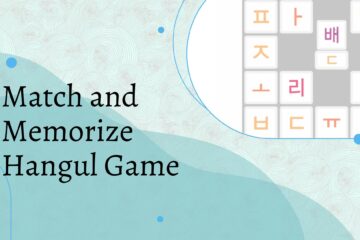If you are feeling that you have a grip on present tense conjugation in Korean the next step is to go into the past! Past tense in Korean might seem tricky at first, but going through a few examples will help a lot. So I’ll introduce the conjugation and we can get started.

How to Make Words in Korean Past Tense?
When turning an unconjugated word into past tense you add ~ㅆ어요 on the end of your word. The ㅆ takes the place of the bottom of a verb, and depending on the verb the ㅆ brings in a vowel to turn into 았/었.
For a quick overview generally, if a verb stem ends inㅏor ㅗ (such as 가다 or 알다) then ~았어요 is added.
And with any other vowel, it will end with ~었어요 added on the end to create the past tense.
Now Korean isn’t so clear-cut, so there are some irregular verbs that have their own rules or exceptions. To get into all that a bit smoother I’ll cover different verbs, and how they end with a vowel or consonant to go over each one by one!
Transforming Verbs into Past Tense in Korean
Now that you know the basics of past tense let’s take a look at some different verbs. We’ll run through a bunch of examples of use cases and make them past tense!
~았어요 Rule 1
To start off simple, any verbs with an ㅏ ending only use ~ㅆ어요 because the ㅏ is already there.
가다 – 갔어요: went
싸다 – 쌌어요: was cheap
만나다 – 만났어요: met
자다 – 잤어요: slept
~았어요 Rule 2
Next verbs ending with ㅏ or ㅗ with a consonant ending bring in the full ~았어요.
살다 – 살았어요: lived
앉다 – 앉았어요: sat
알다 – 알았어요: knew
좋다 – 좋았어요: was good

~았어요 Rule 3
Verbs with an ㅗ ending, combine the ㅗ and ~았어요 to create ~왔어요.
보다 – 봤어요: saw/watched
오다 – 왔어요: came
쏘다 – 쏴어요: shot
~었어요 Rule 1
Every other verb ending with a consonant brings in the full ~었어요.
먹다 – 먹었어요: ate
읽다 – 읽었어요: read
있다 – 있었어요: was
없다 – 없었어요: wasn’t
~었어요 Rule 2
Verbs with an ㅐ, ㅓ, ㅕ ending use ~ㅆ어요.
건너다 – 건넜어요: crossed
보내다 – 보냈어요: sent
꺼내다 – 꺼냈어요: took out

~었어요 Rule 3
Verbs with an ㅜ ending, combine the ㅜ and ~었어요 to create ~워어요.
배우다 – 배웠어요: learned
주다 – 줬어요: gave
~었어요 Rule 4
Verbs with an ㅣ ending, the ㅣand ㅓ from ~었어요 combine to make ㅕ, making it ~였어요.
마시다 – 마셨어요: drank
던지다 – 던졌어요: threw
~었어요 Rule 5
If a verb has an ㅡ ending, lose the ㅡ and just the full ~었어요 is added on the end.
쓰다 – 썼어요: wrote
크다 – 컸어요: was big
하다 Rule
Last up is verbs ending with 하다, which changes to 해 to create 했어요.
일하다 – 일했어요: worked
공부하다 – 공부했어요: studied
전화하다 – 전화했어요: called



0 Comments